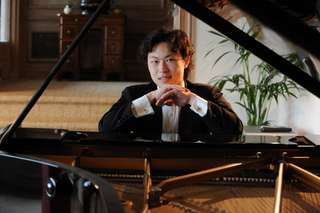|
Back
From Shanghai With Style New York
Zankel Hall, Carnegie Hall
03/03/2010 -
Maurice Ravel; Sonatine – Miroirs
Johannes Brahms: Intermezzi, Op. 117
Franz Liszt: Etudes No. 9 and 10, from Transcendental Etudes
Pyotr Ilyich Tchaikovsky: Polonaise from Eugene Onegin (Arranged by Franz Liszt)
Jue Wang (Pianist)

J. Wang (© Elena Torcida)
“Shanghai people” wrote Stella Dong in her eponymous classic of that city, “have always seen themselves as more stylish and, frankly, more theatrical than any other Chinese.” Jue Wang, the young Shanghai-born pianist making his New York debut last night, exemplifies that Shanghai flair.
With one exception, his choices were glittering, shining, glistening, and his performance matched his music. Thankfully, Mr. Wang does not have the physical flamboyance of the “old” Lang Lang. No hands thrown up in the air, no 19th Century-style leaning back and hunching forward to make his point. Instead, he showed his skills with physical concentration on the Steinway, and utter confidence.
And oh! What music he chose to demonstrate these skills, even if those skills were sometimes very personal. Few pianists can play all five Ravel Miroirs without a little sweat. Two Liszt Transcendental Etudes, a Liszt transcription and an encore of Prokofiev were each Augean stables of difficulties, but nothing seemed to faze this First Prize/Gold Medal winner of the Santander International Music Competition.
Not that his music lacked idiosyncrasies. Most should be praised. But one takes liberties with Ravel’s Sonatine at one’s peril. My score shows Ravel giving dynamic commands every four or five measures, and he was quite serious. The whole piece is constructed so carefully that Mr. Wang’s changes seemed impressive but out of place. His first movement started not “sweetly and expressively” but with dominating playing, almost ranging on the aggressive. Digitally he didn’t miss a trick, but expressively, something was lacking.
The central “Mouvement de Menuet” was again played perfectly, but I fear the prissy Maurice Ravel might have shied away from his jaunty walking pace. For this composer, the minuet was not to be trifled with, yet Mr. Wang didn’t seem to take this too seriously. For the final movement, Mr. Wang could let himself go all out, animated, delightful, ending with a truly spectacular loud arpeggio.
(Towards the middle of the piece, somebody’s cell phone rang and rang. For once I didn’t think obscene insults. In this case I thought, “Wouldn’t those rings be more appropriate during La Vallée des cloches?”)
In Miroirs, Mr. Wang spun out some beautiful paintings. I’m uncertain if he understood the dances of “Alborada del Gracioso”, but with glissandos like his, with double-octave runs which ran the gamut, who cared? Were his birds particularly sad? They sounded quite contented, and the beauty of Mr. Wang’s tone color was sufficient. Finally, “The Valley of Bells”, which I had heard with far more reverberations. Mr. Wang will soon find his own resonances.
Three Brahms Intermezzi were exactly that. From the breathless Miroirs to the breathless Liszt Etudes, this trio was an interlude. It was sedate, simple, and sometimes mundane. Perhaps it was the simplicity which paralyzed Mr. Wang. The actor Richard Burton in his later years, was a director’s dream in the film Brief Encounter. But in one “intermezzo” scene, where he was to order a cup of tea, Burton was unable to curb his exuberance, to utter the mundane. So expressive was he in take after take, that the tea-ordering moments were unusable for the movie.
Nothing is mundane about Brahms’ Opus 117 Intermezzi. But their expressivity is charming, understated. In self-consciously attempting to play with folk-like simplicity, Mr. Wang lost Brahms’ subtle spark of inspiration. If Ravel’s “Boat on the Ocean” was rolling, this was salon music on a cruise liner.
The two Liszt Etudes were thick forests of notes, played with clarity, perfection and sometimes lack of balance. The Tenth whirls around at violent speeds until, it solidifies into an intense downward chromatic scale. Mr. Chang whirled brilliantly, but the scale was just another motif, not granted any special emphasis. He had no problem with the Ninth Etude, which is emotionally even more difficult. Mr. Wang played it like an Italian opera aria, and it was quite telling.
As one would expect the Liszt arrangement of the Eugene Onegin Polonaise was a wonderful demonstration of Mr. Wang’s technical power. His encore of the Albéniz Tango would have warmed the hearts of the Spanish piano jury, and he tossed off a Prokofiev Toccata like child’s play.
Today, Mr. Wang is in a unique leverage point. He is a studying at Manhattan School of Music with Dr. Marc Silverman in the Artist Diploma Program. But he has given a great many recitals in Europe and now America. His artistry and virtuosity are unquestionable. Like so many Shanghai artists who come here, his “style” and “theatricality” (in Ms. Dong’s words) should quickly bloom into character and, hopefully even introspection.
Harry Rolnick
|